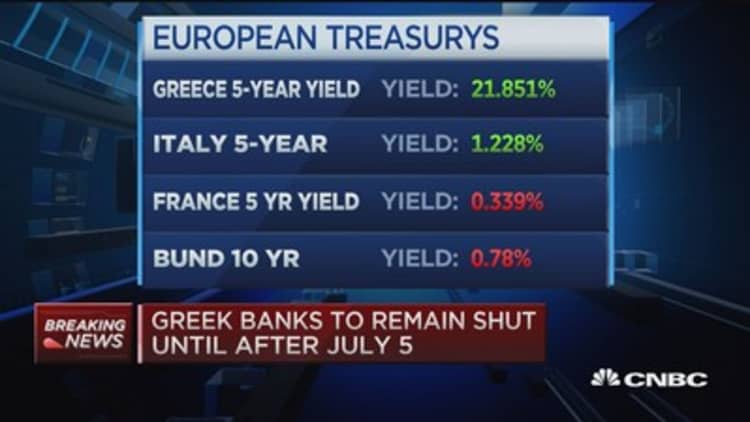
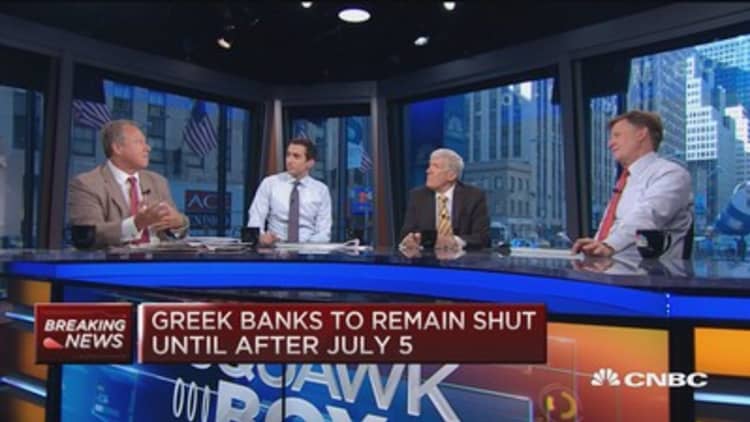
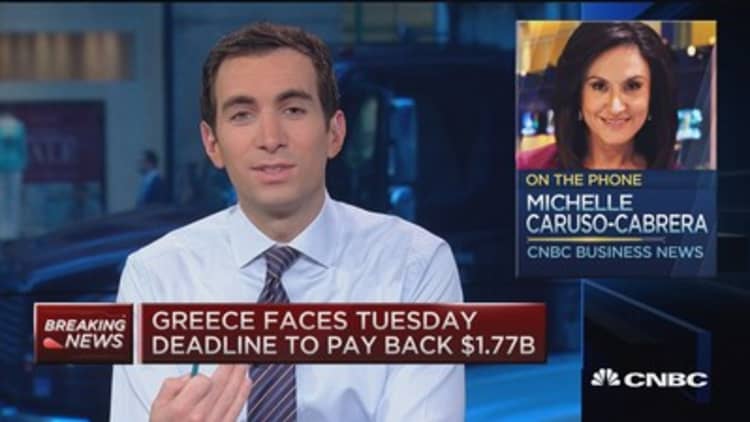
Markets are sending a signal that investors believe the global economy is positioned to weather Greece's potential exit from the euro zone, Jason Trennert, chief investment strategist at Strategas Research, said Monday.
Following a surprise announcement Friday that Greece would hold a referendum on Europe's bailout terms, the European Central Bank said it would not increase emergency funding to the country's banks, as it had throughout last week. That prompted Greece's central bank to advise the nation's banks not to open Monday.
"I would broadly put this in the 'Apocalypse Not' category. It's a tragedy for the Greek people. You have obviously 26 percent unemployment, but I don't think the [European Central Bank] would have made this decision—and it doesn't mean they're right—but I don't think they would have made this decision if they thought that the ramifications would be broader conflagration in Europe itself," he told CNBC's "Squawk Box."
European markets sank Monday as Greece imposed capital controls on the country's banks, and after Prime Minister Alexis Tsipras called for a referendum on proposals put forward by the nation's creditors. The country is now expected to default on a 1.5 billion euro ($1.7 billion) payment to the International Monetary Fund due Tuesday.
Read More Live Blog: Latest on Greece: Banks closed, markets worried
Greeks will vote on July 5 on a package of reforms that would unlock additional bailout funds to the country. A "yes" vote would signal Greeks' will to go along with pension reforms and other austerity measures, while a "no" vote is seen as paving the way for a Greek exit from the euro zone.
The developments also were reflected in bond markets, where yields on Greek debt spiked. Meanwhile, yields on sovereign debt, such as German bunds, fell as investors put money in these safe havens.
The fact that yields on other peripheral, heavily indebted European economies did not soar suggests the market does not believe contagion will take hold, Trennert said. The sentiment is also underscored by trends in European bank credit default spreads, he added.
"In 2011, 2012, those blew out precisely when Greek Treasury yields blew out," he said. "This time around, for the last couple of months, it hasn't been happening, so I think that there's a feeling that they've walled this off.
"I really don't think it's enough in terms of the global economy to overwhelm the good news that's happening in the United States," he added.
Read More Greece: Uncertainty reigns after referendum gamble
The only benefit of a Greek exit is that the situation in the country would potentially deteriorate so badly it might sow the seeds of "actual structural reforms," Trennert said. "The problem now is that you're just putting Band-Aids on gaping flesh wounds."
As lines at shuttered Greek banks get longer and longer, the country's people will realize the best outcome is to stay part of the euro, said Robert Wolf, CEO of cross-border strategy firm 32 Advisors.
Wolf oversaw Russian and Argentine debt restructurings while at UBS and said once the banks get hit, the country's bloodline is cut off. He said he believes civil unrest could break out in Greece, as soon as this week.
"You have two tough options. On your own is the worse one. The next week you're more or less shutting down the economy," he told "Squawk Box," adding, "I've been on other side of the IMF negotiating for clients. They're tough. This is not just going to be a pretend and extend."
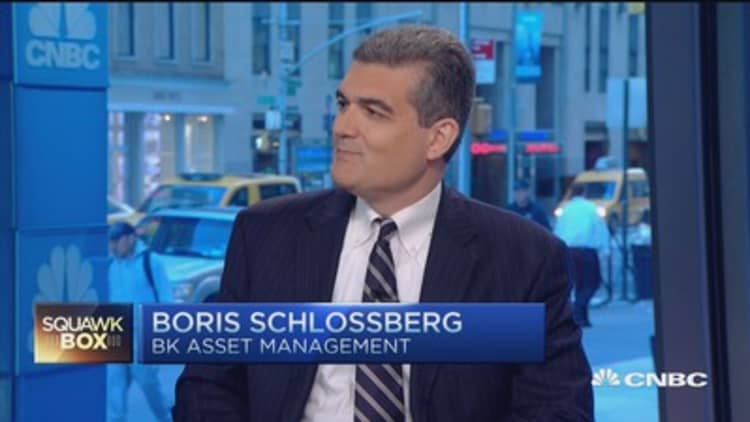
Investors appear to be relaxed about the situation in Greece because they believe some sort of deal will eventually get done, Boris Schlossberg of forex strategy firm BK Asset Management told "Squawk Box." He noted that the euro has nearly returned to Friday's closing level.
"What's ironic about this is the ECB has said the deal is off the table even if the referendum goes through," he said. "But I think the assumption here is that you're hearing all this rhetoric from European officials, basically saying, 'No, no, no. As long as you vote yes, somehow we'll come out with a way to finance you out of this.'"
The IMF, ECB and European Commission's strategy is to scare the Greek people into supporting concessions on the terms of the country's bailout by holding the threat that their assets would be severely devalued over their heads, he added.
Read More ECB forces Greek people to decide: Robert Hormats
Schlossberg said his strategy is to short the euro into the highs. He said the market is focusing on the economic cost of the ECB keeping Greece "in shackles," and not the political cost.
"Greeks, by the way, have had worse economic conditions than we've had in our Great Depression. It can't go on forever, so they have to make some sort of compromise," he said.
"I think ultimately this is a bigger structural problem than the markets are considering because the long-term political ramifications of this are not over yet, and we're going to be feeling more pain as we go forward."
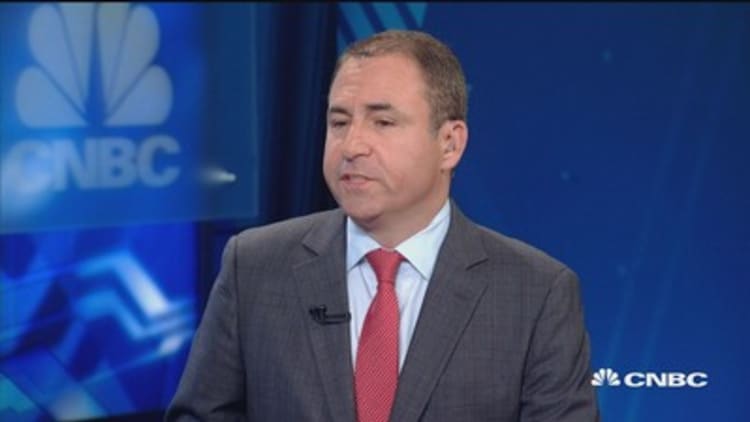
Alec Young, investment strategist at Oppenheimer Funds, said the most likely scenario is the IMF, ECB and European Commission agree to extend aid until the referendum and the Greeks accept the austerity measures. In that event, a moderate government will likely be voted into power, negotiators will kick the can down the road and the situation will stabilize, he said.
German Chancellor Angela Merkel "has made clear that a yes vote is a vote for the euro. I think most Greeks want to stay in the euro," he said. "Our best guess is that the commerce scenario prevails."
As for how to play the situation, Young suggested adding to risk assets on the market weakness. He said he likes U.S. equities, especially those with a cyclical bent, which unlike bond proxies, have not been bid up. High-yield debt and senior loans as well as emerging market and developed international equities—including European stocks—also look attractive, he added.
Read More Markets are calm about Greece, but don't be complacent
"We would buy Europe this week because the core view is that it's more likely that this gets resolved in a calm way. Obviously it's not a slam dunk," he said. "These are obviously high stakes bets."

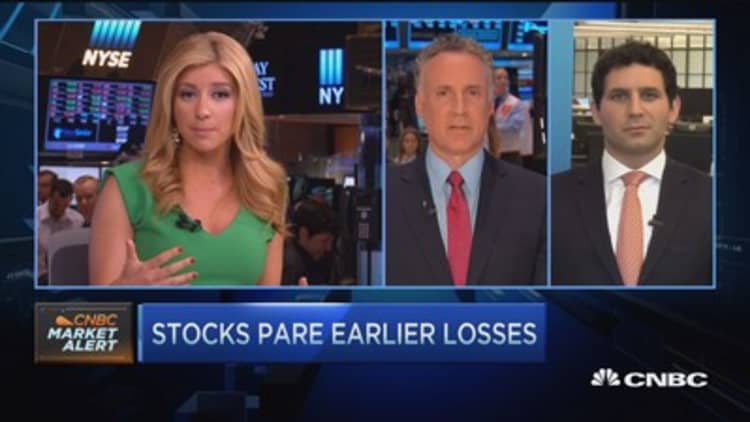
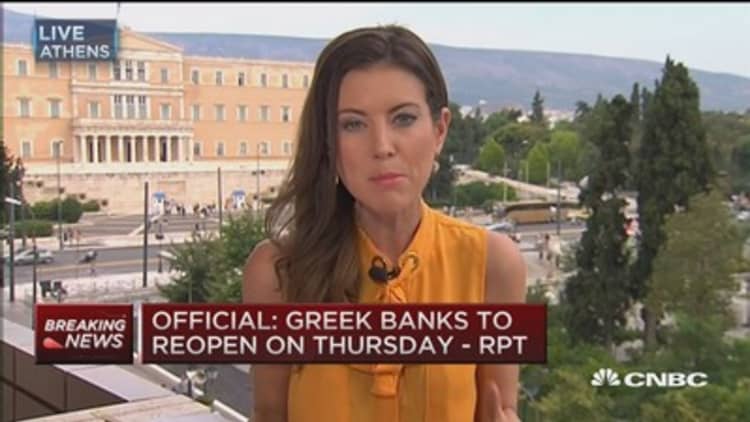
There is no doubt the ECB will do whatever it takes to safeguard the remainder of the euro zone, said Ebrahim Rahbari, European economics director at Citigroup. He does not see the central bank taking preventative measures, but instead reacting to signs of major contagion.
The ECB can employ a number of different policy support should those signs appear, he said. It may expand lending to banks, increase the size of its asset-purchasing program or even create new programs to support its monetary mandate.
"There are a lot of things the ECB could do that we think would be realistic if it came to major contagion," he told CNBC's "Squawk on the Street."
Read MoreCommentary: Greece must sign a deal now
The market's calm attitude is deserved so long as the ECB can succeed in ring-fencing the remaining peripheral economies, said Art Cashin, UBS' director of floor operation at the New York Stock Exchange.
"Those firewalls have got to rope off the rest of Club Med. You've got to get Portugal, Spain and Italy all protected," he told "Squawk on the Street."
Whether or not the run on banks underway in Greece spreads to those countries will determine if contagion has begun, he said.


